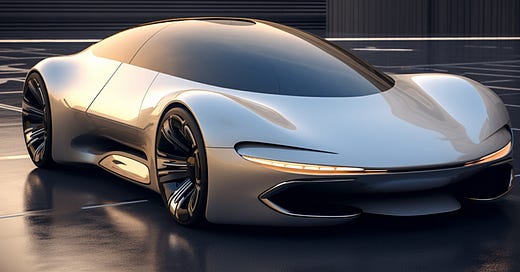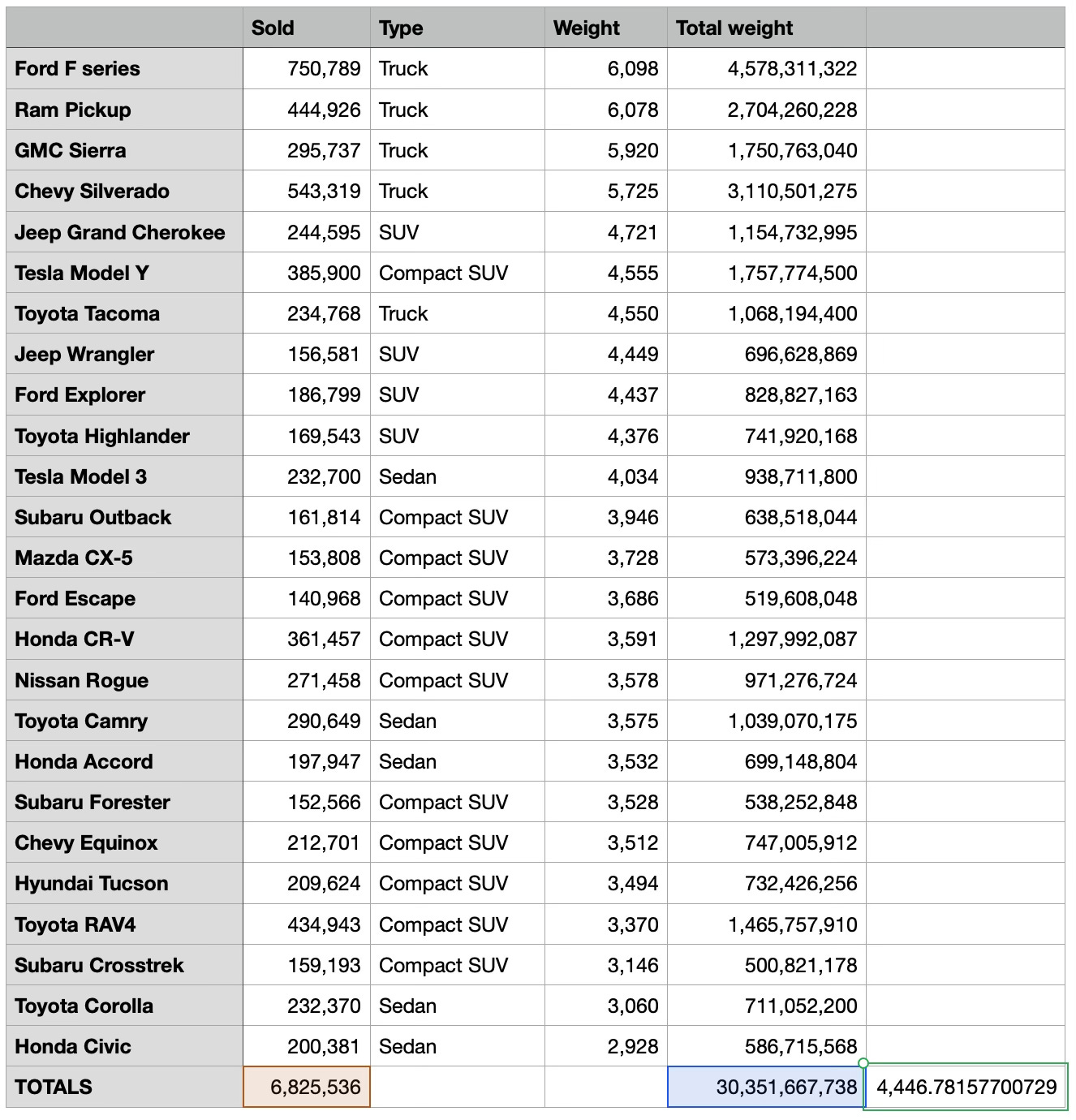Fact: Teslas weigh LESS than the average new car.
"EVs are incredibly heavy" is one myth that needs to DIE.
Thanks for reading my newsletter about what’s true vs. what’s bullshit in pop culture. I Monday editions (like this one) free to all, so subscribe! Paid subscribers also get Tuesday and Thursday editions (thank you for making it possible). Enjoy!
Among the many crazy false claims about electric cars is that they are extremely heavy, tearing up roads and tires and brakes, and causing much more damage to the universe than regular cars. It’s one of the popular anti-EV talking points that you’re sure to find on any bingo card of similar claims.
Some time ago I read a blog refuting this, comparing a Tesla Model 3 to the average new car, and sure enough, the Tesla was a little bit lighter. However, the blog was inadequately referenced, and I couldn’t rely on it to convincingly refute the claim.
So I decided to do it myself.
First, I’ll explain my methodology. I took the 25 bestselling new cars in the United States in 2023, according to this article in Car & Driver. I didn’t break it down by type of car, i.e. only comparing Tesla Model 3s to other sedans, because all cars live on the same roads as all other cars. A Ford F-350 4x4 Crew Cab weighs a hell of a lot more than any Tesla, but nobody sounds the alarm about all the damage those must do to roads and tires; yet they’re all sharing the same roads. I was satisfied with this list of 25, because it’s best representative of what’s hitting our roads the most, and I didn’t want to kill myself trying to track down every single car sold and running the numbers on it.
Next, I had to ascertain an average weight for each of the 25. For the trucks, there’s a huge range, from around 4,000 to around 8,000 pounds for each model. You’ve got the quarter ton through the half tons; 2WD and 4WD, various cab sizes, a crazy range. For the trucks I averaged the lightest and the heaviest, and for all of the weights, I used the CarSpecs website. For all other cars, there was much less variance, so I selected a “nicely equipped” model, never the lightest, never the heaviest. I figure this gives a reasonably fair average.
For the two Teslas on the list, I used the heaviest version with the largest battery.
So here is my data (sorry this is just a screenshot, if Substack adds support for tables I can do better):
Note these are sorted by weight, but the sorting doesn’t really matter. That “Sold” column shows how many were sold in 2023, and then multiply each by the average weight for that model and we get the total pounds of car added to the roads in 2023, which is shown in the “Total weight” column. Over 30 billion pounds of car were added to American roads in 2023. Divide that by the total number of cars sold (6.8 million) and we get an average weight of 4,447 pounds.
A Tesla Model Y is 4,555 (that’s about 100 pounds heavier than average) and a Tesla Model 3 is 4,034 pounds (about 400 pounds lighter than average). If we combine the numbers for both models (2,696,486,300 pounds of Teslas equaling 618,600 cars) we get an average weight of 4,359 pounds… 196 pounds less than the average new car.
Weaknesses in this informal “study”? Obviously it’s not comprehensive, there are plenty more than just these 25 models on the road. And I estimated the weights for trucks and chose my own personal notion of a representative model for the others, but I think I did a reasonable job.
Anti-EV pundits will always be able to cherrypick and give examples ad infinitum where a given EV is heavier than a given ICE car. But what this study shows is that no matter how you slice it, EVs are not significantly heavier than other cars; and when you consider the 25 most popular cars sold, they are actually lighter. They weigh less on average, doing less aggregated damage to roads and tires — if that’s even a thing you care about.
I rest my case.






Hi Brian, I am an EV advocate (and proud skeptic) and wanted to add a couple of thoughts. It would be interesting to see the corresponding weights of models that are offered in both ICE and BEV models e.g. the Ford F-150, Chevy Silverado, BMW 7 series, I am sure there are others. Also, about the tire wear thing - when I last replaced my tires at a large, reputable chain, I overheard the tech discussing with a Tesla owner how they come in so often with worn-out tires over a relatively short mileage interval, so I suspect there is something to this. My theory - the vehicles that are higher on the list tend to come with big-boy truck tire & wheel setups that may be better suited for their heft. The Teslas ride on regular sedan tires which may be asked to "do more" at the contact patch to keep those 4500 lb cars on the road, and hence scrub off tread at a higher rate?
You are saying that most/many/some people who buy an SUV or truck do not really 'need' such a vehicle because they do not go off-road or carry large things or something similar, rather use them just as 'cars'. I'm afraid this is a red herring that misses my point completely. Don't get hung up on my use of the word 'need' because what I mean is that they are looking for a vehicle that has certain attributes not that they actually need those attributes i.e. they are in the market for an SUV or a truck even if they are just driving kids to school. Saying that an F350 is equivalent to a Honda Civic because both are used as 'cars' and the category is just 'marketing' is silly. One is clearly much larger than the other and marketing a Civic as a truck isn't going to fool anyone.
We can dispense with all of this because I can make my point another way: it is clear that the type of car we pick will have more to do with whether it is above or below average than whether it is an EV or not. In other words if I pick a truck it will be above average whether it is an EV or not (and whether there is any 'marketing' influence or not). If I pick a sedan it will be below average whether of not it is an EV.
If our goal is to assess if trucks are heavier than average or sedans are lighter than average then this analysis is fine, but if our goal is to assess EVs it is VERY misleading. If we pick the Cybertruck then we would conclude that EVs are twice the average! If we pick the Honda Civic we would conclude that non-EVs are much lighter than average! Both are ridiculous.
You could actually do a proper statistical analysis of this and compare the correlation between 'type' and 'weight' with the correlation between 'EV/non-EV' and 'weight', i.e. is the type of vehicle better predictor of its weight or is whether or not it is an EV better.